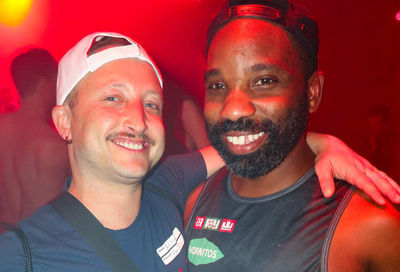Harsh Reality
Clinic debuts ''Reality Check,'' exceeds AIDS Walk goal
One in every 20 residents of Washington D.C. is living with HIV, according to a new ad campaign that will appear on many of the district’s Metro buses, subway cars and subway platforms during the next several months. Whitman-Walker Clinic’s ”HIV Reality Check” ads compare the capital’s HIV and AIDS statistics to those of sub-Saharan Africa: ”D.C.’s rate is higher than that of Nigeria, Angola, Ethiopia — and 24 more of the 44 sub-Saharan countries.”
Those estimates and figures are taken from a 2005 analysis by D.C. Appleseed Center for Law and Justice.
The harsh reality emphasizes the mission of the Whitman-Walker Clinic and the need to raise awareness about HIV and AIDS in D.C. It also explains why nearly 3,000 people marched on the streets of Washington, despite the cold weather and rain, on Saturday, Oct. 7, for the 20th annual AIDS Walk.
”[The walk] serves the purpose of raising awareness and it’s also an opportunity for people who know someone living with HIV and AIDS to do something tangible,” says clinic spokesperson Kim Mills.
While funds raised are still being accounted for, Mills confirmed that this year’s AIDS Walk raised over $580,000, surpassing the 2006 goal of $500,000 in gross revenues.
In addition to the success of the walk, leadership from the clinic released a written statement on Wednesday, Oct. 11, announcing that the Northern Virginia facility, which had been slated for closure two years ago due to financial difficulties, would now stay open.
”[T]he Clinic is doing far better now than it was a year ago,” Donald Blanchon, Whitman-Walker Clinic’s CEO, said in a written statement. ”[W]e have ensured that there will be no interruption in care for our Northern Virginia clients.”
Whitman-Walker Clinic also announced in the statement that Bruce Weiss, former executive director of the Sexual Minority Youth Assistance League (SMYAL), would serve as the new director of the Northern Virginia facility beginning Nov. 6. Before his work at SMYAL, Weiss served as the deputy executive director of the D.C. Comprehensive AIDS Resources and Education Consortium (DCCARE).
”The Clinic is doing well and we are here to stay,” Mills says, ”especially Northern Virginia, where there had been some questions about a year ago.”
Support Metro Weekly’s Journalism
These are challenging times for news organizations. And yet it’s crucial we stay active and provide vital resources and information to both our local readers and the world. So won’t you please take a moment and consider supporting Metro Weekly with a membership? For as little as $5 a month, you can help ensure Metro Weekly magazine and MetroWeekly.com remain free, viable resources as we provide the best, most diverse, culturally-resonant LGBTQ coverage in both the D.C. region and around the world. Memberships come with exclusive perks and discounts, your own personal digital delivery of each week’s magazine (and an archive), access to our Member's Lounge when it launches this fall, and exclusive members-only items like Metro Weekly Membership Mugs and Tote Bags! Check out all our membership levels here and please join us today!



















